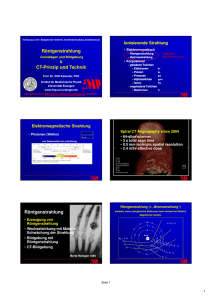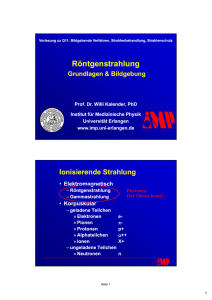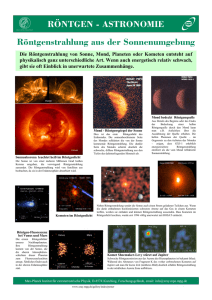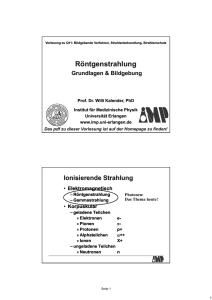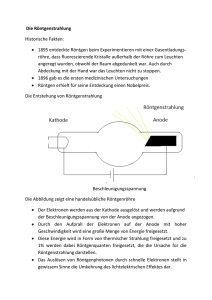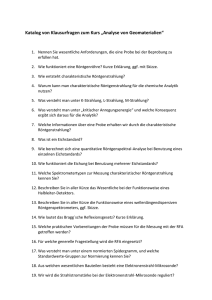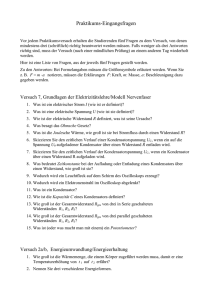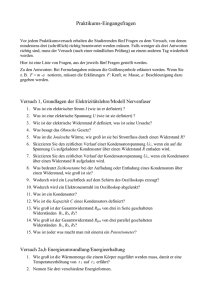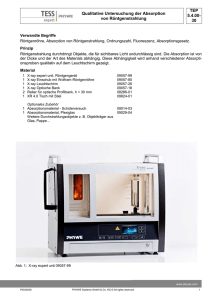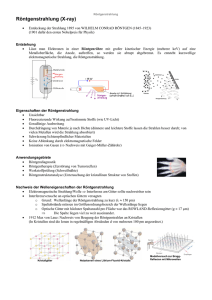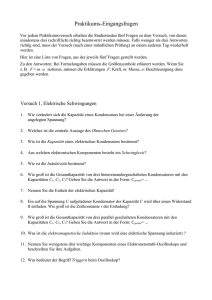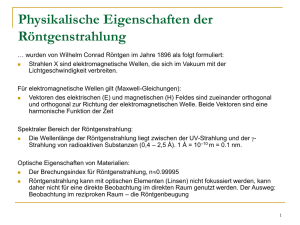Röntgenstrahlung
Werbung
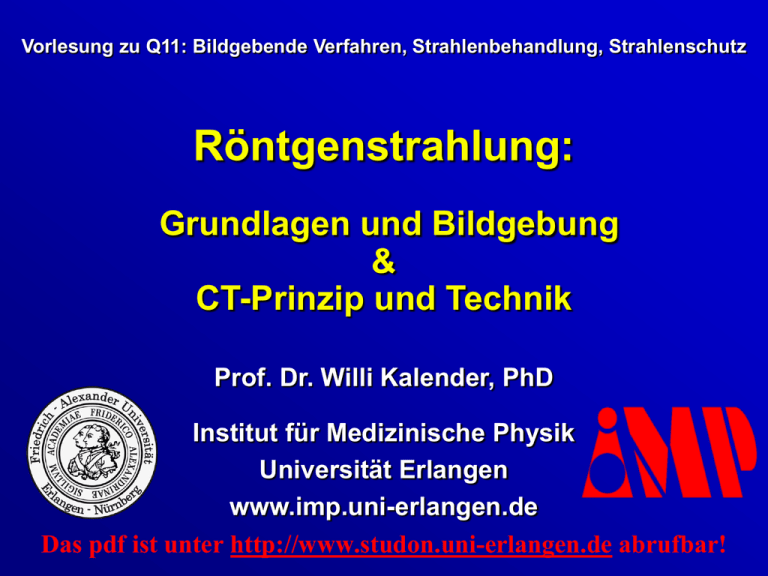
Vorlesung zu Q11: Bildgebende Verfahren, Strahlenbehandlung, Strahlenschutz Röntgenstrahlung: Grundlagen und Bildgebung & CT-Prinzip und Technik Prof. Dr. Willi Kalender, PhD Institut für Medizinische Physik Universität Erlangen www.imp.uni-erlangen.de Das pdf ist unter http://www.studon.uni-erlangen.de abrufbar! Röntgenstrahlung • Erzeugung von Röntgenstrahlung • Wechselwirkung mit Materie, Schwächung der Strahlung • Bildgebung mit Röntgenstrahlung • CT-Bildgebung Berta Röntgen 1895 Spiral CT Angiography since 2004 • 64-slice scanner • 3 s total scan time • 0.5 mm isotropic spatial resolution • 2.4 mSv effective dose Röntgenstrahlung (= „Bremsstrahlung“) entsteht, wenn energiereiche Elektronen beim Aufprall auf Materie abgebremst werden. Erzeugung von Röntgenstrahlung Röntgenröhre e– Gehäuse (Glas oder Keramik) Vakuum Anodenteller (z.B. Wolfram) Achse Heizstrom und -spannung z.B. 15 V, 6 A („Filament“) g Glühdraht/Kathode e– Röhrenstrom I [mA] Austrittsfenster Röntgenstrahlung (Zentralstrahl) – + Röhrenspannung U [kV] Anodenwinkel z.B. = 10° Moderne Drehanoden-Röntgenröhre Drehanode Röntgenspektren bei 40, 60 und 80 kV Anode: W (Z=74) / Re (Z=75) Winkel = 10° 2.5 mm Al Eigenfilterung N(E) Erzeugte Bremsstrahlung ungefiltert K-charakteristische Strahlung a1 Dosis: a2 Strom • Zeit [mAs]: I T Spannung [kV]: U Abstand [cm]: R Verfügbare Bremsstrahlung gefiltert 0 20 40 Photonenergie 60 b1 b2 80 E [keV] Emax= eU Röntgenstrahlung • Erzeugung von Röntgenstrahlung • Wechselwirkung mit Materie, Schwächung der Strahlung • Bildgebung mit Röntgenstrahlung • CT-Bildgebung CT-Kolonoskopie Wechselwirkung von Photonen mit Materie abhängig von der • Energie E der Strahlung • Anzahl der Streuzentren pro Volumen, d.h. der Dichte r • Ordnungszahl Z Absorption Streuung Photoeffekt „Absorption“ • Wechselwirkung mit gebundenen Elektronen • stark abhängig von Ordnungszahl und Energie t ~ (Z3 / E3) • sprunghafter Anstieg von t, wenn E > Ei • gesamte Energie des Photons wird am Wechselwirkungsort als Dosis deponiert Compton-Effekt „Streuung“ • Wechselwirkung mit einzelnen Elektronen • inelastische Streuung mit Richtungsänderung des Photons und mit Energieübertrag • nur geringe Energieabhängigkeit, aber sC ~ r Wechselwirkung von Photonen mit Materie • Photoeffekt t ~ r Z3 / E3 • Compton-Effekt sC ~r • Rayleigh-Streuung sR ~ r / E2 • Paarbildungseffekt k ~ r Z2 (bei E > 1.022 MeV) Für die Bildgebung mit Röntgenstrahlung sind Photo- und Compton-Effekt von Bedeutung! Schwächung und Kontrast 10 kV: Photoeffekt (hier Totalabsorption) 30 kV: Photo+ Comptoneffekt 60 kV: Photo+ Comptoneffekt 300 kV: Comptoneffekt Röntgenstrahlung • Erzeugung von Röntgenstrahlung • Wechselwirkung mit Materie, Schwächung der Strahlung • Bildgebung mit Röntgenstrahlung • CT-Bildgebung ca. 1904 Detektoren in der Radiographie • • • • • • Leuchtschirme (Szintillatoren) Film, Film-Folien-Systeme Bildverstärker Speicherfolien Festkörperdetektoren indirekt Festkörperdetektoren direkt Filmkassette mit Bleiabschirmung dünnere vordere Verstärkerfolie Röntgenfilm dickere hintere Verstärkerfolie Andruckschaumstoff Aufbau einer Röntgenfilmkassette Festkörperdetektoren Flachdetektor mit direkt elektronischem Auslesen Röntgenaufnahmen des Schädels a.p. lateral CT-Aufnahmen des Gehirns 1974 1994 Röntgenstrahlung • Erzeugung von Röntgenstrahlung • Wechselwirkung mit Materie, Schwächung der Strahlung • Bildgebung mit Röntgenstrahlung • CT-Bildgebung x y S z y x Fächerstrahlgeometrie (x-y-Ebene) Röntgenröhre y x Messfeld mit Objekt Detektor (typ. 1000 Kanäle) y x y x Und wie entsteht das Bild? Pro Detektorschicht und Umlauf werden etwa 1000 Projektionen zu je 1000 Kanälen akquiriert. y x Demo zur CT-Bildrekonstruktion Schädelscan Thoraxscan Einfluss des Faltungskerns Glättend „soft“ Standard Aufsteilend „bone“ Einfluss des Faltungskerns Glättend Standard Aufsteilend Was wird im CT-Bild dargestellt? Der lineare Schwächungskoeffizient gemittelt über jedes Volumenelement in Hounsfield-Einheiten x y S z y x Die Hounsfield-Skala CT-Wert mG - mWasser 1000 (HU) mWasser µG= linearer Schwächungskoeffizient des Gewebes G CT-Wert, HU 3000 Knochenfenster C/W 1000, 2500 2000 1000 Mediastinumfenster C/W -50, 400 0 Lungenfenster -1000 C/W -600, 1700 Spiral CT: Scanning Principle Start of spiral scan Direction of continuous patient transport Path of continuously rotating x-ray tube and detector 0 z, mm 0 t, s Kalender WA et al. Radiology 1989; 173(P):414 and 1990; 176:181-183 Spiral-CT = schnelle und lückenlose Abtastung März 1989 Schichtdicke 8 mm 12 s Scan bei 1s / Rot. Pitch 1 Scanvolumen 96 mm 0.3 mm Cone-beam Spiral CT (CSCT) here: M = 64 • 0.4 s rotation • 640.6 mm State of the Art in Multi-slice Spiral CT Rotation time per 360° 0.27 - 0.35 s Slice width 0.5 - 0.6 mm Simultaneously scanned slices z-coverage per rotation 64 (- 320) 40 - 160 mm Scan times “whole body“ <1 - 20 s Scan range >1000 mm Isotropic spatial resolution 0.4 - 0.6 mm Effective dose <1 - 10 mSv Typical values for high-performance scanners 28 s scan time at 0.5 mm isotropic resolution 35 Visualization of the complete peripheral artery tree 1889 mm in 42 s with 0.33 mm isotropic resolution Courtesy of University Hospital Munich-Grosshadern, Germany 36 Visualization of the complete peripheral artery tree 1889 mm in 42 s with 0.33 mm isotropic resolution Courtesy of University Hospital Munich-Grosshadern, Germany Dual-Source CT (DSCT) Dual Source CT • System set-up – 2 Straton tubes and 2 x 64-slice acquisition with double z-sampling – 280 ms gantry rotation – 1.6 tons rotating mass • X-ray power – Acquisition with up to 2 x 100 kW • Cardiac CT – 75 ms temporal resolution (trot/4) • Dual Energy CT – Simultaneous acquisition with 80 kV / 140 kV * SOMATOM Flash, Siemens Healthcare, Forchheim, Germany Flash performance: High speed Scan direction Flash Cardiac 0.26 s 75 ms per slice Scan only for one heart phase and only during one heart beat and at minimum radiation dose !!! Cardiac CT with Flash 100 kV 320 mAs 59 bpm triphasic CM injection 60 ml Ultravist 370 + 50 ml saline bolus Effective dose 0.98 mSv Courtesy of S. Achenbach, University of Erlangen DSCT: High scan speed Spiral CT angiography scan range 700 mm pitch 2.8 rot. time 280 ms scan time 1.8 s dose 1.4 mSv Und wie schaut’s mit der Dosis aus? Dose Values are no Secret! Typical patient dose values in MSCT: E = 10 mSv (1-20 mSv) BfS 1998 Dose distribution calculated by Monte Carlo Methods on cadaver scans 44 General information regarding CT dose EC Radiation Protection Report N° 154, 2008 Dual Source CT at high pitch • 63 y, male, 57 b.p.m. • Pitch 3.2 • E = 0.84 mSv “Ultralow” dose scanning at high pitch 2010 with “state-of-the-art” detector Effective dose: 0.07 mSv 80 kV, iterative reconstruction 54 kg, HF 55/min Courtesy of S. Achenbach, Cardiology, U of Erlangen CT mit intelligenten Ansätzen und innovativer Technologie 70 cm/s Tischvorschub bei 70 kV mit TCM, dyn. Kollimierung, iterativer Rekonstruktion und dosiseffizientem „low noise“-Detektor: 0.22 mSv effektive Dosis! Courtesy of Stefan Schönberg, U of Mannheim 2D-Projektionsbildgebung vs. 3D-Schichtbildgebung Projection image vs. CT image (in the same patient) All structures along a ray are superpositioned and may obscure important details. Images: Courtesy of Michael Lell, Erlangen Only the structures in the section of interest are displayed. Performance of mammography „90 % of patients could be cured if in breast screening: disease were detectedcancer at a very early stage, 70 % if the malignant 62% - 88% lesion in the breastSensitivity is still smaller than 1 cm.“ Source: Carney et al. Annals of Internal Medicine 2003 (Stockinger, Günther: „Katastrophe für die Frauen“, Der Spiegel, Nr.15 Performance of mammography (2002), S. 203) in breast cancer screening: Sensitivity 63% - 78% Source: Report and metanalysis of state-of-the-art breast cancer screening and monitoring approaches. Dep. of Radiology, Erasmus MC, Rotterdam 2009 Breast CT scanner concept Transition from single-circle flat detector to spiral CT detector Photon-counting energy-discriminating CdTe detector 100 % geometrical and absorption efficiency Kalender WA et al. Eur Radiol 2012; 22(1):1-8 Conclusions High-resolution breast CT based on CdTe detector technology can outperform DM and BT with respect to - 3D spatial resolution, - detectability of microcalcifications and - soft tissue lesions at an AGD below 5 mGy! Clinical tests are planned to start at U of Erlangen and U of Aachen late in 2014. Danke für Ihre Aufmerksamkeit! ZMPT Zentrum für Medizinische Physik und Technik, Erlangen, Henkestr. 91
